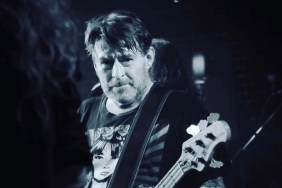A deadset Justice League of homegrown hard rock musos from Melbourne and beyond have teamed up to record a cover of The Byrds’ classic ‘Turn! Turn! Turn!’ to help fund the fight against prostate cancer.
Styling themselves under the monicker of ‘One In Seven’ (after the number of Australian men affected by the disease), the group — featuring members of both legendary and up-and-coming homegrown groups including Baby Animals, The Screaming Jets, Electric Mary, Massive, Tequila Mockingbyrd & more — have delivered a rocked-up version of the vintage tune featuring 20 vocalists, 6 drummers, 6 guitarists, 3 bassists and a didgeridoo.
The project was masterminded by Tequila Mockingbyrd tubthumper Josie O’Toole, following her dad’s recent cancer battle.
“It started off just as a thought, then I talked it over with a few close friends. Once I took it to Facebook I had more than 30 musicians, two photographers and a film crew involved,” she tells Southern Cross Austereo.
“The response has been incredible and it’s been wonderful to witness everyone coming together like this.
“Many of those involved have been affected by prostate cancer, so it has a real personal meaning for a lot involved and I think it really shows.”
The Ricki Rae-produced track is available via all digital platforms, with all funds raised will be split between The Prostate Cancer Foundation of Australia, Prostate Cancer UK, the Movember Foundation and The Rennie Grove Nurses.
You can also contribute to the One In Seven Pozible campaign to score rewards including a limited edition vinyl and a compilation CD featuring the bands involved in the track.
Give One In Seven’s cover of ‘Turn! Turn! Turn!’ a spin below, and remember:
Prostate cancer affects one in seven Australian men during their lives. It is currently the second highest cause of male cancer death yet it is one of the most survivable cancers if detected early (92% chance of survival past 5 years). What most don’t know is that a simple blood test at age 50 (age 40 if family history) could show warning signs years before any symptoms develop.












